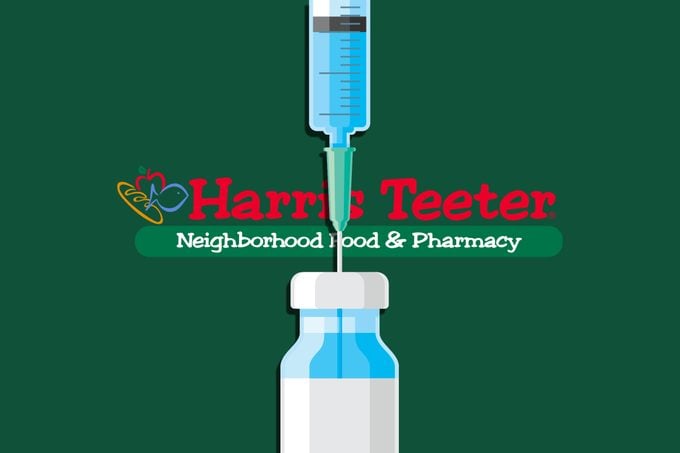How to Get a Flu Shot at Harris Teeter
Updated: Mar. 11, 2022
Almost one-third of flu vaccines are given in retail settings such as pharmacies. Harris Teeter is one of them.
Prevent the spread of the flu
If you’re like a lot of people across the country, you’re understandably preoccupied with when you’ll be able to get a Covid-19 vaccine. But don’t let that distract you from the other important vaccine this year: The one for flu.
“The influenza virus causes severe illness and death every year, so it is imperative for people to get vaccinated,” says LaTasha Perkins, MD, a practicing family physician in Washington, DC. “This year it is even more important because the flu virus presents in some of the same way that the Covid-19 virus does.”
That makes it difficult to tell them apart, which is important for both treatment and prevention. Harris Teeter is just one retail chain offering vaccines at multiple locations.
Who should get the flu vaccine?
The Centers for Disease Control and Prevention (CDC) recommends that everyone over the age of six months receive a flu vaccine. The shot is especially important for those at a higher risk of complications from the flu, even death. That means people 65 years and older, people with serious chronic conditions like asthma or diabetes, pregnant women, and children under the age of five.
On the other hand, certain groups should talk to their doctor or pharmacist before rolling up their sleeves. People who have egg allergies, for instance, should not get an egg-based vaccine (most of this year’s vaccines are egg-free). You should also be careful if you currently have flu symptoms or if you’ve ever had Guillain-Barré syndrome, a rare type of autoimmune-related paralysis that can be triggered by infections.
Is the vaccine effective?
It’s too early in this year’s flu season to know how well the vaccine is working. But, typically, if the vaccine and flu strains are well-matched, you can expect the vaccine to be 40 to 60 percent effective, according to the CDC.
The vaccine changes every year to keep up with mutations in the flu virus. That means the effectiveness also varies. But even if the vaccine isn’t 100 percent effective in preventing the flu, it will tone down the severity. So you’re less likely to be one of the 400,000 or so people hospitalized or 22,000 who die from the infection.
Is the vaccine safe?
Bad reactions to the vaccine are extremely rare. More often, some people have a sore arm where the needle went in or mild fever and aches.
“Like any other vaccine, there may be side effects,” says Beth Oller, MD, a practicing family physician in Stockton, Kansas. “Most of these side effects are signs that your body is doing what it is supposed to do when you get a vaccine, which is activating its immune system to provide you protection.”
Regarding the fact that the flu vaccine changes every year, “these are minor changes so safety from past vaccines can be extrapolated to this year’s vaccine, as well,” says Dr. Oller.
Flu vaccines do not cause the flu, nor do they cause autism. Here are 40 things doctors want you to know about vaccines.
What types of vaccines are available?
In addition to egg-free vaccines (one is a shot and one is a nasal spray), there are more powerful vaccines for people 65 and older, as well as standard vaccines for everyone else.
Flu shots are the most common standard flu vaccine available. You can get the flu nasal spray if you’re healthy, between the ages of two and 49, and if you aren’t pregnant.
Almost all vaccines this year are quadrivalent, which means they protect against four strains of the flu virus.
“There are different types of flu vaccines out there and some may be more effective for you based on your personal history,” says Alexa Mieses Malchuk, MD, a practicing family physician in Durham, North Carolina. “You should talk with your family physician about which sort of flu shot is right for you.”
The most important thing? “Get a flu vaccine every year,” says Dr. Oller.

How can I get a flu shot at Harris Teeter?
Find a nearby Harris Teeter Pharmacy and schedule a vaccine appointment online. Although appointments aren’t required, they are recommended. You can also fill out a consent form online, using a digital signature. The length of time you spend in the store will depend on how much information you provided ahead of time and whether you have an appointment.
Most insurance, including Medicare Part B, cover the cost of an influenza vaccine. Otherwise, prices vary depending on which vaccine you get.
To protect against Covid-19, store team members are wearing personal protective equipment and sanitizing between each customer. They’re also asking customers to practice social distancing of six feet or more.
What is the best time to get a flu shot?
The flu season in North America usually begins in October and peaks between December and February, though it can last longer. The best time to get a flu vaccine is early fall, according to the CDC. That time has already passed for the 2020-2021 season, but it’s not too late.
And there should be plenty of supply: Vaccine manufacturers predict they will produce almost 200 million doses this season, about 30 million more than last season. Harris Teeter is just one of thousands of locations offering the vaccine, in addition to clinics and doctors’ offices. The CDC reports that almost one-third of all flu shots in the U.S. are given in a retail setting, like a pharmacy.
Remember, it’s never too late for the flu shot.

















